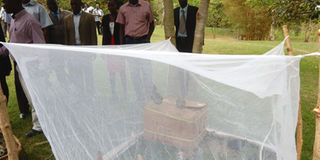West Nile leaders demand law on mosquito nets

Misuse. Some of the chicks caged under mosquito nets in Arua District as a demonstration on how they protect them from predators. PHOTO BY FELIX WAROM OKELLO.
What you need to know:
Issue. People are using the mosquito nets for caging chicks, tomato and coffee seedlings against pests
ARUA/ZOMBO.
Leaders in Arua and Zombo districts want the Ministry of Health to enact a law that will punish citizens who misuse the treated mosquito nets distributed by the government.
The leaders revealed how residents use mosquito nets as bedsheets, and for caging chicks and coffee seedlings against pests.
Speaking during a malaria consortium meeting in Arua District at the weekend, the Arua District vice chairperson, Mr Genesis Acema, said such a law will send a strong signal to the communities who misuse them that there are heavy penalties in waiting.
“People who use these nets for raising chicken should be punished incase such a law is enacted. People are more scared about HIV/Aids and are giving less attention to malaria which kills many especially children and is responsible for some of the miscarriages,” Mr Acema said.
It also emerged during the meeting that although all households benefited from the government programme, in some homes, men were denying their spouses the nets hence exposing them to malaria infections.
In Zombo District, the acting district health officer, Mr Sam Ajoga, said: “People are using the mosquito nets for caging chicks, tomato and coffee seedlings against pests instead of using it to protect their children from mosquito bites.”
Malaria accounts for 50.5 per cent of common sicknesses in Zombo District but Mr Ajoga said most parents in the district instead use them as bed sheets.
The Zombo Resident District Commissioner, Mr Isaac Lulaba, called for more media campaign if the fight against malaria is to be sustained.
“Make use of media and involve more village health teams to talk to these communities. Let’s also involve local, cultural, religious leaders and others including schools so that we have a zero prevalence of malaria by 2020,” Lulaba said.
Ms Doreen Buatru, the Arua District health educator, said non-compliance to treatment is still an issue as some mothers do not complete malaria dose.
Statistics from Arua District health office indicate that 386 people of all ages die from malaria annually.




